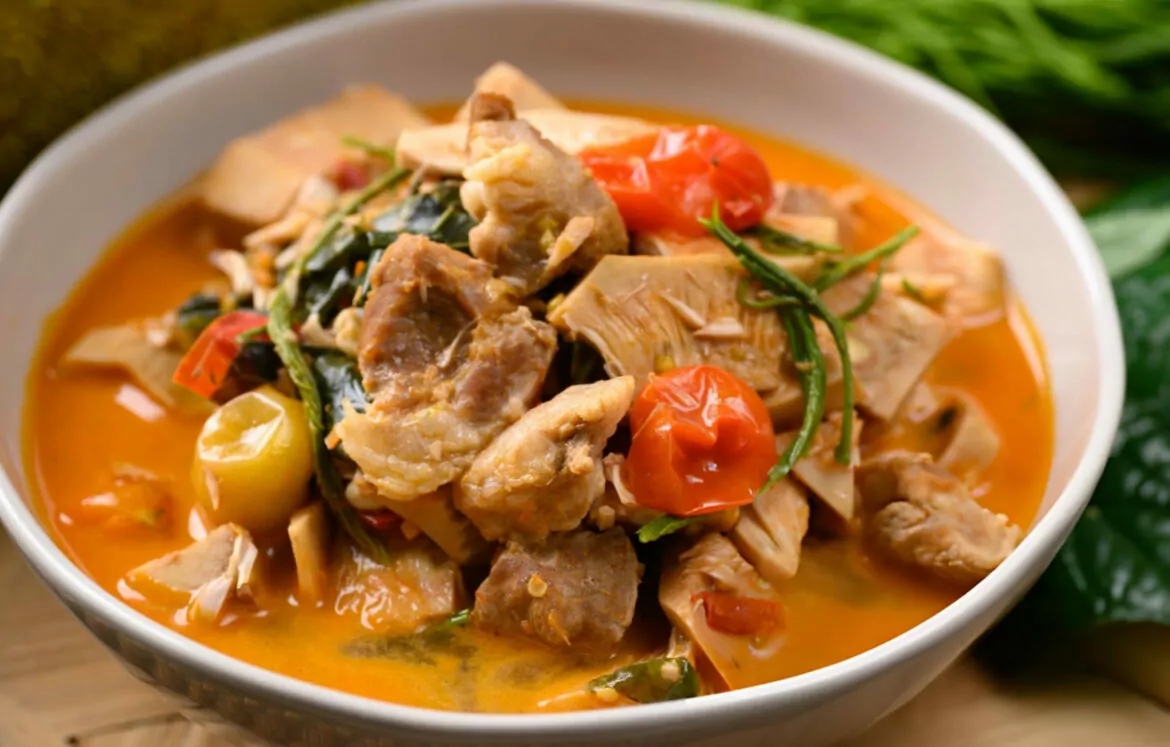This jackfruit curry with beef spare ribs is a symphony of bold flavors, rich textures, and aromatic spices. The tender beef effortlessly soaks up the savory broth while young green jackfruit adds a unique, subtle sweetness to the dish. Simmered with a fragrant curry paste made of dried red chilies, garlic, shallots, and fermented shrimp paste, this hearty curry strikes the perfect balance between savory, umami, and fresh. Complemented by juicy tomatoes and leafy greens, it’s an exquisite comfort dish that pairs beautifully with steamed jasmine rice.
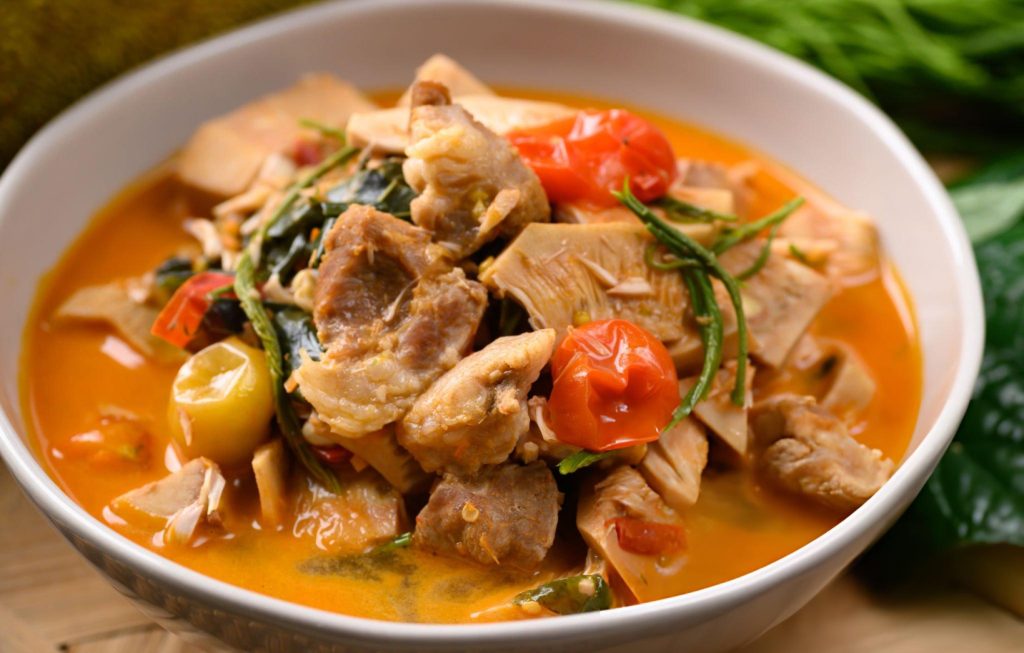
Ingredients for Jackfruit Curry
This recipe relies on simple yet impactful ingredients that come together to create a deeply satisfying dish.
For the curry paste, garlic and shallots build a savory base, while dried red chilies lend heat and a smoky aroma. Fermented shrimp paste adds unmistakable umami depth—essential for an authentic curry experience. If you prefer a milder version, reduce the chilies slightly. For those avoiding shrimp paste, anchovy paste can be used sparingly as an alternative.
The heart of the dish comes from tender beef spare ribs, cut in the Asian style for easy cooking. Young green jackfruit in brine adds a meat-like texture and soaks up the curry flavors beautifully. Cherry tomatoes provide natural sweetness and acidity, balancing the richness of the broth. Leafy greens like wild betel leaves and Cha-om (climbing wattle) introduce earthy, fresh notes. If unavailable, substitute with spinach or bok choy.
For serving, jasmine rice is a non-negotiable pairing, ensuring the rich broth can be fully appreciated.
Step-by-Step Instructions for Perfect Jackfruit Curry
Prepare the Beef and Broth
Start by placing the beef spare ribs into a large pot and covering them with 4 cups of water. Add a tablespoon of fish sauce to infuse the meat with an initial layer of savory flavor. Bring the water to a rolling simmer over high heat, then reduce to a gentle, consistent simmer. Allowing the beef to cook slowly ensures tender, fall-off-the-bone results.
Prep the Jackfruit
While the ribs are simmering, drain the canned jackfruit and rinse it under cold water to remove any brine. Cut the jackfruit into small, bite-sized pieces. This will ensure it evenly absorbs the curry flavors and softens perfectly in the broth. Add the jackfruit to the pot alongside the beef ribs, letting it simmer gently.
Make the Curry Paste
To create the aromatic curry paste, begin by grinding the dried red chilies into a fine powder using a spice grinder. In a mortar and pestle, pound the garlic and chopped shallots into a coarse paste. The natural moisture released by the garlic and shallots will help bind the mixture together. Once softened, add the ground chilies and continue to pound until a rough paste forms. Finally, incorporate the fermented shrimp paste, mixing well to combine. The result should be a cohesive, fragrant paste that is slightly chunky.
Combine and Simmer
Skim off any scum or impurities that rise to the surface of the broth to maintain its clarity and clean flavor. Stir in the freshly prepared curry paste, ensuring it dissolves evenly into the simmering broth. Allow the beef and jackfruit to continue cooking gently for 2-3 hours. The slow simmering process helps meld the flavors of the curry paste while ensuring the ribs become fork-tender.
Add Greens and Tomatoes
Once the beef is tender, introduce the halved cherry tomatoes and leafy greens, such as betel leaves and Cha-om. Gently stir to submerge them into the broth, allowing the greens to wilt and the tomatoes to soften. This should only take 1-2 minutes to maintain the vibrant color and texture of the vegetables. If the broth becomes too thick, add a splash of water to adjust the consistency without diluting the flavor.
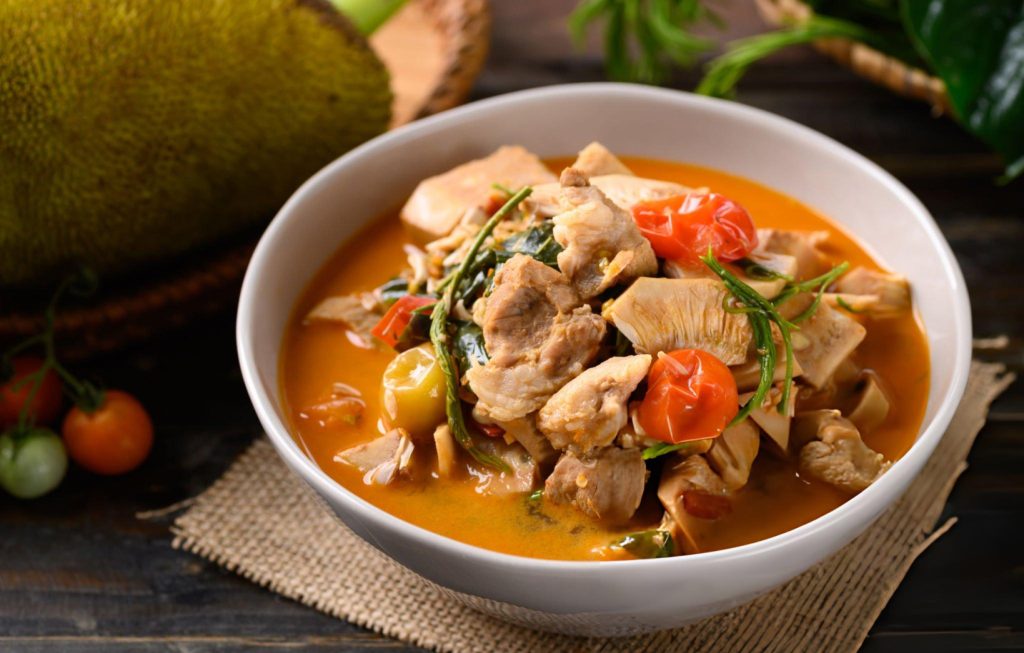
Recipe Tips
Adjust the spice level by reducing or increasing the dried chilies according to your preference.
Simmer the broth at a low, steady temperature to ensure the beef becomes tender without overcooking.
Taste the broth before serving; balance the flavors by adding fish sauce for saltiness, shrimp paste for depth, or a pinch of sugar to counter excess saltiness.
If the broth seems too watery, allow it to reduce slightly by simmering uncovered for a few extra minutes.
What to Serve With This Recipe
Rice Pairings:
Steamed jasmine rice is the perfect accompaniment, as it absorbs the curry’s rich and savory broth. For a heartier option, pair with sticky rice or coconut rice.
Dipping Ideas:
Serve crusty bread or flaky roti alongside the curry to mop up the flavorful broth.
Side Dishes:
Pair this curry with a refreshing cucumber salad, stir-fried greens, or a simple papaya salad for a bright, zesty contrast.
Customization Ideas
Replace beef spare ribs with chicken thighs or pork shoulder for a different protein option. Adjust the simmering time to suit the meat.
Create a vegetarian version by omitting the meat and adding tofu or extra jackfruit for a similar texture. Enhance the depth with a splash of soy sauce.
Add aromatic herbs like Thai basil, lemongrass, or kaffir lime leaves for an additional layer of fragrance.
Frequently Asked Questions
How long should I simmer the beef to ensure tenderness?
Simmer the beef spare ribs gently for 2 to 3 hours until they are tender and easily fall off the bone.
Can I replace the fermented shrimp paste with another ingredient?
Yes, you can use a small amount of anchovy paste or omit it entirely for a milder flavor.
What can I use as a substitute for Cha-om or wild betel leaves?
Spinach, bok choy, or water spinach are great substitutes that maintain the earthy freshness of the dish.
How do I store and reheat leftover jackfruit curry?
Store the curry in an airtight container in the refrigerator for up to 3 days. Reheat it gently on the stove over low heat.
Can I make the curry paste ahead of time for convenience?
Absolutely! Prepare the paste up to 3 days in advance and store it in an airtight container in the refrigerator.
This jackfruit curry with beef spare ribs delivers a bold, aromatic experience in every bite. The tender ribs, soft jackfruit, and fragrant curry paste come together to create a dish that is both hearty and comforting. With its customizable ingredients and easy-to-follow steps, this recipe is perfect for both weeknight dinners and special occasions. Serve it with jasmine rice and watch it become a favorite at the dinner table.
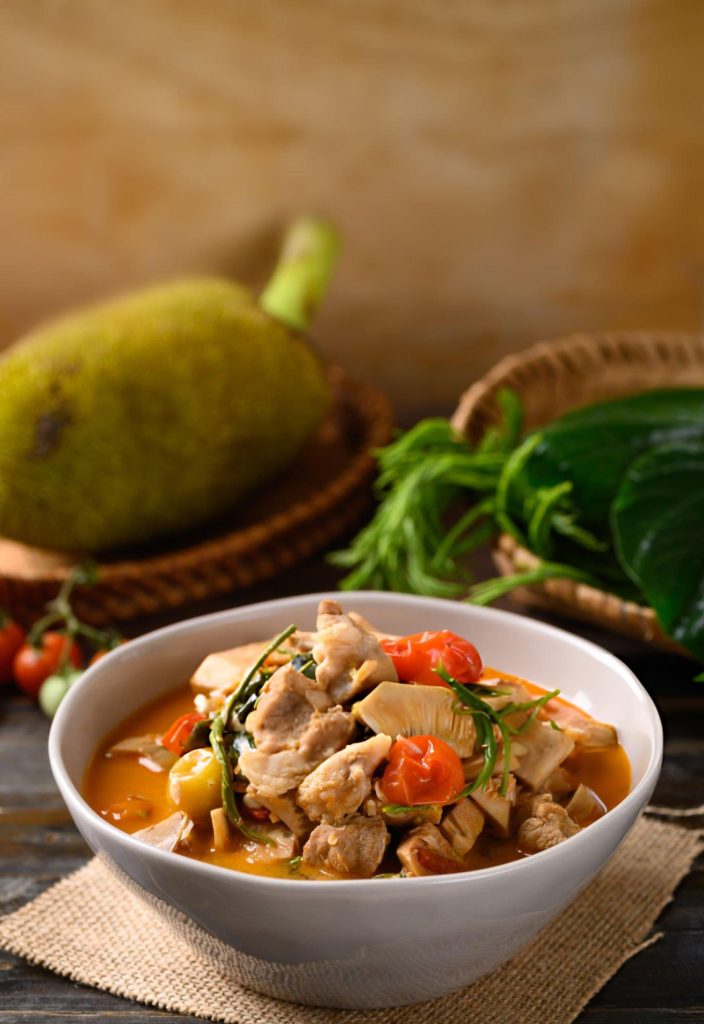
Ingredients
Curry Paste
6 cloves garlic
½ cup chopped shallots
0.5 oz dried red chilies (see note 1)
2-3 teaspoons fermented shrimp paste (see note 2)
Jackfruit Curry
1 lb beef spare ribs, cut Asian style (see note 3)
4 cups water
1 can young green jackfruit in brine (20 ounces/550 mL; drained weight: 300g/10.5 oz)
1 cup halved cherry tomatoes
1-2 tablespoons fish sauce
20 wild betel leaves or another leafy green, cut into 1-inch strips (see note 4)
1 cup Cha-om (climbing wattle, see note 5)
Jasmine rice for serving
Instructions
Begin by placing the beef spare ribs in a large pot. Pour in the water and add 1 tablespoon of fish sauce. Bring the mixture to a rolling simmer over high heat, then reduce to a gentle simmer to allow the ribs to cook evenly.
While the ribs are simmering, prepare the jackfruit. Drain the can and rinse the jackfruit thoroughly under cold water. Cut it into smaller, bite-sized chunks and add them to the pot alongside the ribs.
While the ribs and jackfruit cook, prepare the curry paste. Begin by grinding the dried chilies into a fine powder using a spice grinder; set aside. In a mortar and pestle, pound the garlic and chopped shallots into a coarse paste. Once the garlic and shallots release their juices and become slightly mushy, incorporate the ground chilies. Continue to pound until the mixture forms a rough paste. Finally, add the fermented shrimp paste, ensuring it is well combined. The paste should be cohesive but doesn’t need to be perfectly smooth.
As the broth simmers, skim off any scum or impurities that rise to the surface to keep the broth clear and flavorful. Stir in the freshly prepared curry paste and allow the flavors to meld as the beef continues to cook. Let it simmer gently for 2 to 3 hours, or until the ribs are fall-off-the-bone tender. The cooking time may vary depending on the thickness of the meat on the ribs.
Once the ribs are tender, add the halved cherry tomatoes and all the leafy greens, including the betel leaves and Cha-om. Stir gently to submerge them in the broth, letting the greens wilt and the tomatoes soften slightly, which should take about 1-2 minutes. If needed, add a bit more water, but ensure the liquid level remains just enough to keep everything submerged without being overly watery.
Taste the broth and adjust the seasoning to your liking. Add more fish sauce for a salty, umami-rich kick or an additional touch of shrimp paste for more depth of flavor. If the broth leans too salty, a pinch of sugar will balance the flavors beautifully.
Serve the jackfruit curry piping hot over steamed jasmine rice, allowing the flavors to shine in every bite. Enjoy the tender beef ribs, soft jackfruit, and rich, aromatic broth that bring this dish to life.
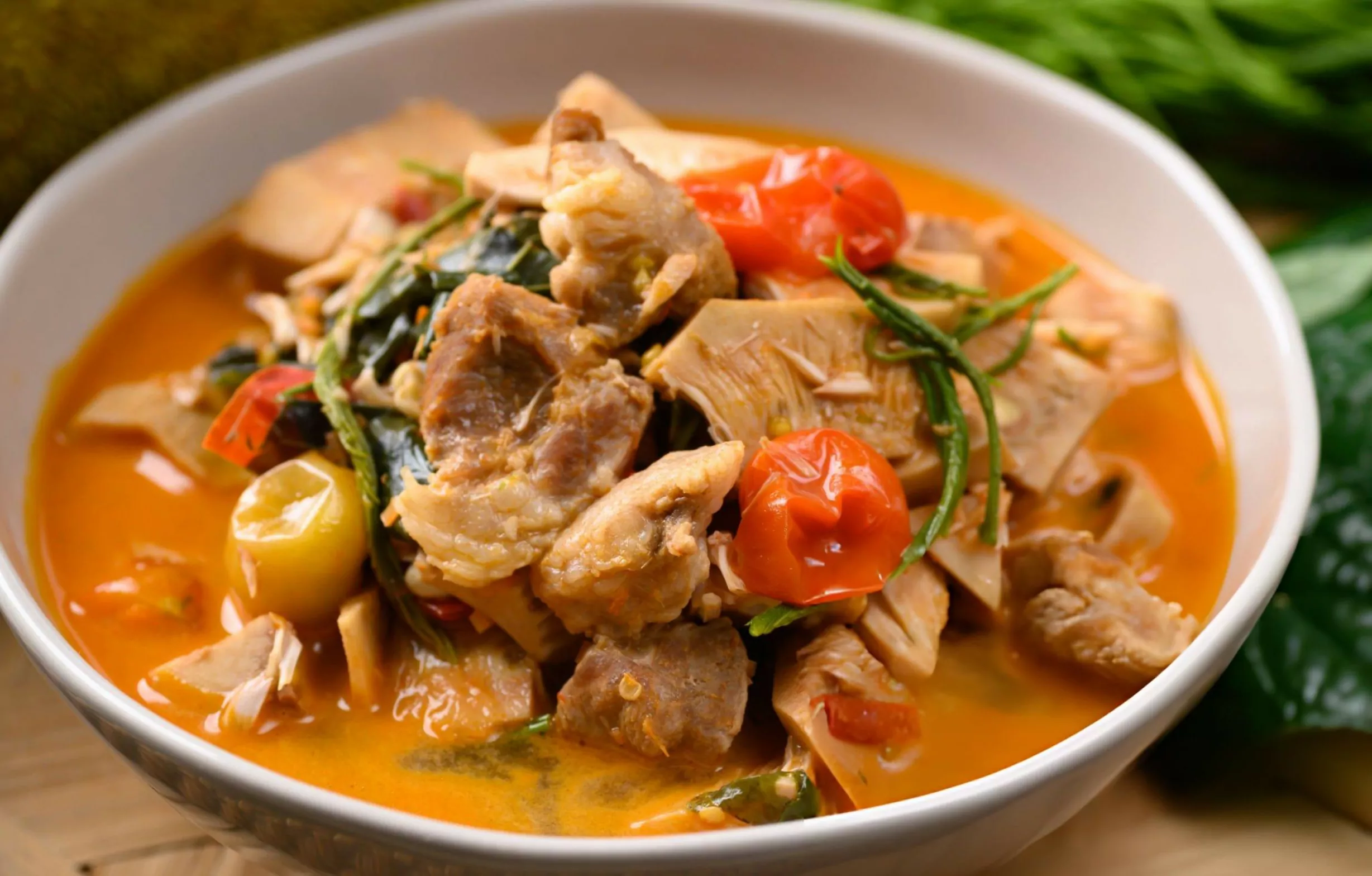
Jackfruit Curry with Beef Spare Ribs Recipe
Ingredients
Curry Paste
- 6 cloves garlic
- ½ cup chopped shallots
- 0.5 oz dried red chilies see note 1
- 2-3 teaspoons fermented shrimp paste see note 2
Jackfruit Curry
- 1 lb beef spare ribs cut Asian style (see note 3)
- 4 cups water
- 1 can young green jackfruit in brine 20 ounces/550 mL; drained weight: 300g/10.5 oz
- 1 cup halved cherry tomatoes
- 1-2 tablespoons fish sauce
- 20 wild betel leaves or another leafy green cut into 1-inch strips (see note 4)
- 1 cup Cha-om climbing wattle, see note 5
- Jasmine rice for serving
Instructions
- Begin by placing the beef spare ribs in a large pot. Pour in the water and add 1 tablespoon of fish sauce. Bring the mixture to a rolling simmer over high heat, then reduce to a gentle simmer to allow the ribs to cook evenly.
- While the ribs are simmering, prepare the jackfruit. Drain the can and rinse the jackfruit thoroughly under cold water. Cut it into smaller, bite-sized chunks and add them to the pot alongside the ribs.
- While the ribs and jackfruit cook, prepare the curry paste. Begin by grinding the dried chilies into a fine powder using a spice grinder; set aside. In a mortar and pestle, pound the garlic and chopped shallots into a coarse paste. Once the garlic and shallots release their juices and become slightly mushy, incorporate the ground chilies. Continue to pound until the mixture forms a rough paste. Finally, add the fermented shrimp paste, ensuring it is well combined. The paste should be cohesive but doesn’t need to be perfectly smooth.
- As the broth simmers, skim off any scum or impurities that rise to the surface to keep the broth clear and flavorful. Stir in the freshly prepared curry paste and allow the flavors to meld as the beef continues to cook. Let it simmer gently for 2 to 3 hours, or until the ribs are fall-off-the-bone tender. The cooking time may vary depending on the thickness of the meat on the ribs.
- Once the ribs are tender, add the halved cherry tomatoes and all the leafy greens, including the betel leaves and Cha-om. Stir gently to submerge them in the broth, letting the greens wilt and the tomatoes soften slightly, which should take about 1-2 minutes. If needed, add a bit more water, but ensure the liquid level remains just enough to keep everything submerged without being overly watery.
- Taste the broth and adjust the seasoning to your liking. Add more fish sauce for a salty, umami-rich kick or an additional touch of shrimp paste for more depth of flavor. If the broth leans too salty, a pinch of sugar will balance the flavors beautifully.
- Serve the jackfruit curry piping hot over steamed jasmine rice, allowing the flavors to shine in every bite. Enjoy the tender beef ribs, soft jackfruit, and rich, aromatic broth that bring this dish to life.
Notes
- Use any type of dried red chilies depending on your desired spiciness level.
- For a mild curry, opt for large chilies like guajillo or puya peppers.
- For a spicier curry, use smaller chilies such as dried Thai chilies.
- Combine both types for a balanced heat level.
- To reduce the heat, do not decrease the quantity of chilies. Instead, remove the seeds and pith.
- The amount listed is the minimum required, but you can add more for extra flavor.
- Start with 2 teaspoons of shrimp paste for a subtle umami flavor.
- If you prefer a stronger “funk,” gradually add more.
- As an alternative to shrimp paste, use 1-2 tablespoons of miso paste for a milder, earthy flavor.
- Look for spare ribs at Asian markets, where they are often cut into short pieces.
- The ribs may already be separated into individual pieces or come as long strips that you’ll need to cut yourself.
- Full-sized ribs can also be used, but they may be slightly more cumbersome to eat.
- Wild betel leaves (known as “la lot” in Vietnamese or “bai chaploo” in Thai) can often be found at Thai or Vietnamese markets.
- If unavailable, sturdy greens like Chinese broccoli or Swiss chard make excellent substitutes.
- Cha-om, a uniquely fragrant Thai vegetable, can sometimes be found fresh or frozen in Thai grocery stores.
- If Cha-om is unavailable, substitute with non-neutral-flavored greens like chrysanthemum greens (also called “tong ho” in Chinese). Use about 2 cups of these or any other flavorful greens available to you.

